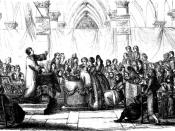The French Revolution was the event that most influenced American foreign policy. The French Revolution sparked hostility between the Jeffersonian Democratic-Republicans and the Hamiltonian Federalists. The Revolution was in fact a world revolution because the revolution influenced not only France, but also other civilized countries. When the Revolution entered the Reign of Terror, Federalist Aristocrats feared for their lives and were wary of the Jeffersonian mobs. Federalists once supported the Revolution, but now, strongly opposed it. The Jeffersonians regretted the bloodshed, but agreed that some aristocratic heads was a cheap price for freedom.
The Franco-American alliance bound America to help the French defend the West Indies, and the Jeffersonians and the Hamiltonians supported opposite views. The Democratic-Republicans supported the alliance, even though they were cautious about the defense of the islands because of the risk of war. They were eager to end the conflict against Britain, and side with the French because the Americans owed the French their freedom and it was time to repay the debt.
President Washington believed that war had to be avoided at all costs because the military was weak, the economy was unstable, and the country was disunited. He knew that if America could avoid conflict with Europe, it would be populous enough and strong enough to defend its rights with force. Hamilton and the Hamiltonians supported Washington's views.
When Washington's Neutrality Proclamation was issued, the Jeffersonians and the Hamiltonians butt heads once again. The Pro-French Jeffersonians strongly opposed the Neutrality Proclamation, while the Pro-British Hamiltonians were heartened by it. The Jeffersonians were angered by the Proclamation because of the fact that Washington declared neutrality without consulting Congress. Washington, still wanting to avoid war, sent Chief Justice John Jay to London in 1794. The Jeffersonians opposed this action because Jay was a "Britain-lover" and...


